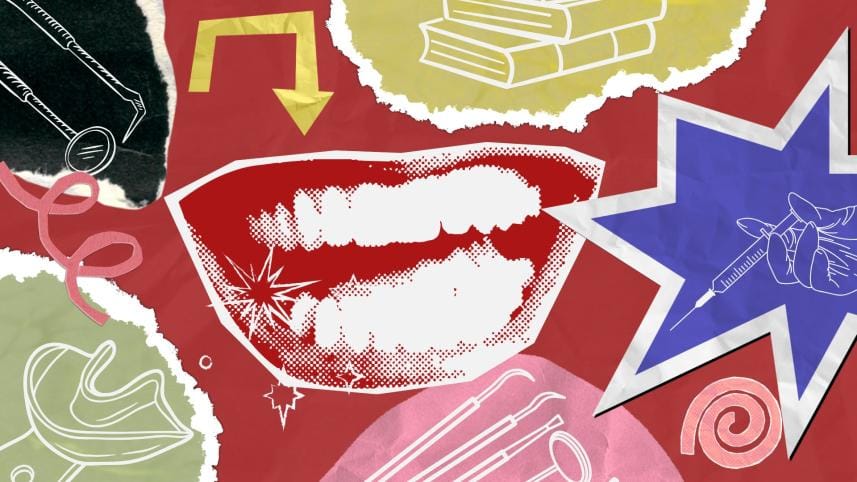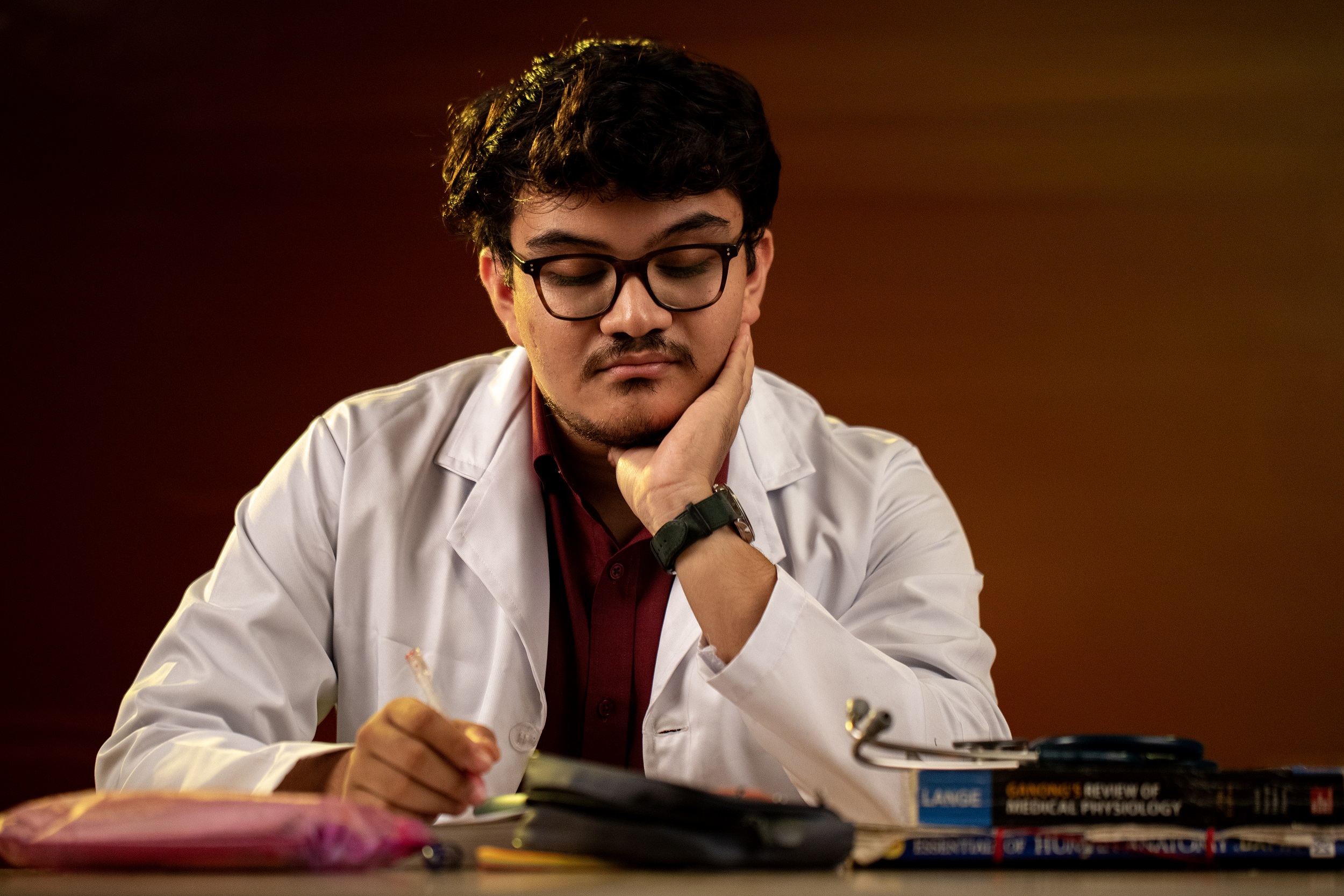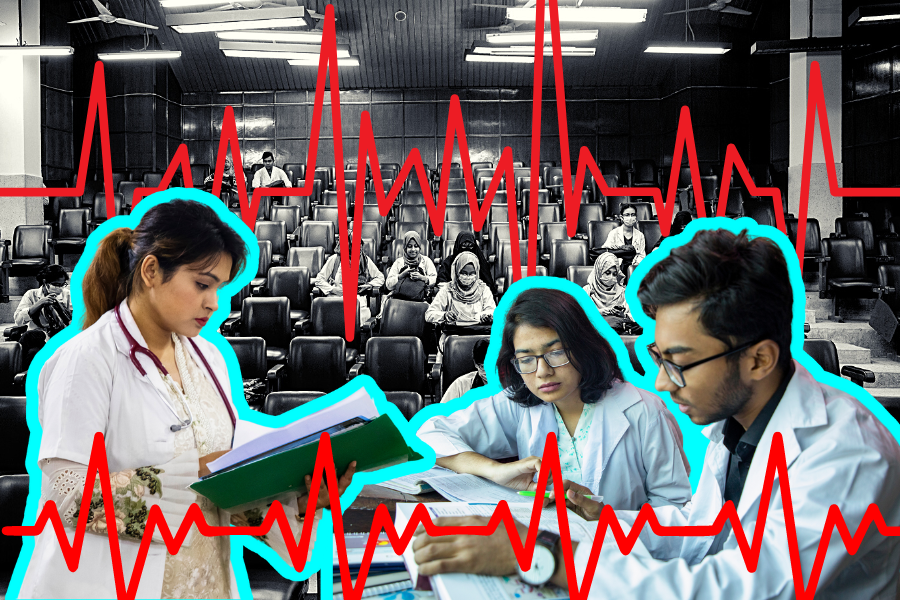Dissecting the dental dream

Ever wondered why medical colleges in Bangladesh draw a line when it comes to teeth? You can study every inch of the human body in an MBBS degree, but when it comes to the mouth, an entirely separate discipline takes over: the Bachelor of Dental Surgery (BDS).
Despite being one of the oldest branches of healthcare, dentistry remains strangely unfamiliar to many. Some see it as a mere subset of medicine, others as a secondary option. Yet, behind those white coats and tiny mirrors lies a science that combines medicine, precision, and artistry in ways few professions can.
What's taught in the BDS programme?
The BDS programme in Bangladesh runs for five academic years followed by a year of internship. Just as medical aspirants take the Medical Admission Test, dental hopefuls sit for the Dental Admission Test, usually held a week after the medical one. This year, however, admission tests for medical and dental colleges across Bangladesh will be held on the same day using the same question paper.
Admission into government dental colleges or the dental units of medical colleges depends entirely on merit scores. Even those who plan to study in private institutions or abroad must qualify by securing at least 40 marks out of 100 in the national dental admission test.
The BDS programme structure resembles that of the MBBS curriculum, though with a much more focused lens on the oral and maxillofacial region.
The course is divided into four phases. The first and last phases span one and a half years each, while the second and third are one year each. In the first phase, students study Anatomy just like Medical Students, but their scope is narrower. They focus intensely on the head and neck rather than the entire body. Dental students also study Physiology and Biochemistry as a single integrated subject, and two additional subjects that medical students do not encounter: Dental Anatomy and the Science of Dental Materials.
In the second phase, General and Dental Pharmacology are taught alongside Pathology and Microbiology. The third phase includes Medicine, Surgery, Periodontology, and Oral Pathology, gradually narrowing from general medical sciences to dental specialisation. In the final phase, students study five core subjects: Oral and Maxillofacial Surgery, which focuses on the mouth, jaw, and facial bones; Conservative Dentistry and Endodontics, which involves root canals and restorative work; Prosthodontics, covering dental prostheses such as crowns, bridges, and implants; Orthodontics and Dentofacial Orthopaedics, which deals with braces and facial growth modification; and Paediatric Dentistry and Dental Public Health, focusing on oral health in children and within communities.
One unique feature of the dental curriculum is the logbook system. During their final phase, students must record every clinical procedure they perform under supervision. This ensures that theoretical knowledge is consistently reinforced through practical experience and accountability.
Dental education in Bangladesh has gone through significant reforms over the years. A major change took place in the 2017-18 session, when the curriculum was extended from four to five years to allow for more clinical exposure. Another reform is scheduled for the 2026-27 session, which will introduce Dental Radiology as a separate subject and divide Paediatric Dentistry and Dental Public Health into two independent courses. These changes are designed to modernise the curriculum, align it with international standards, and increase opportunities for hands-on learning.
Understanding the intricate layers of the dental profession
Reflecting on the deeper dimensions of the dental profession, Dr Nitish Krishna Das of the Department of Oral and Maxillofacial Surgery at Shaheed Suhrawardy Medical College said, "In our society, professional choices are often guided by convention rather than conviction. Many pursue fields that are socially celebrated, and MBBS naturally becomes the most coveted option for aspiring physicians. Yet, success is rarely determined by the path one takes. It depends instead on the wisdom to recognise opportunities and the perseverance to utilise them fully."
Dr Das elaborated that Dentistry offers precisely such a space, one that is profoundly underappreciated yet abundant in scope. Among its branches, Oral and Maxillofacial Surgery (OMFS) stands as one of the most intellectually demanding and versatile. It encompasses the surgical treatment of diseases, injuries, and congenital or acquired defects of the mouth, jaws, and facial region.
Maxillofacial surgeons undertake a wide spectrum of procedures. These include the removal of impacted teeth and cysts, corrective jaw surgeries that restore alignment and balance, and the management of facial fractures resulting from trauma. They also diagnose and surgically treat oral tumours and cystic lesions, perform reconstructive surgeries for cleft lip and palate, and address complex congenital deformities. Many also contribute to oral oncology and facial aesthetic surgery, bringing together restoration, precision, and compassion in one delicate practice.
"Dentistry is a discipline that constantly evolves with science and human need," Dr Das continued. "It is expansive, encompassing clinical care, academic teaching, aesthetic enhancement, surgical mastery, and the endless possibilities of research. The more one immerses in it, the more it reveals its depth. Many might step into dentistry as an alternative after missing out on MBBS, but often they discover that it was their true calling all along."
What to expect during the internship phase
After completing the academic phases, graduates begin a mandatory one-year internship designed to bridge theory and practice. Interns rotate through General Surgery and Medicine for one month each, followed by one and a half months in each of the five specialised dental subjects. They also spend fifteen days in emergency care, where they handle dental trauma and acute infections that test both their technical skill and composure.
Dr Qamrun Nesa Alam Uzma, currently an intern at Shaheed Suhrawardy Medical College, describes the experience with honesty. "As interns, we are privileged to learn under skilled mentors," she explains. "But dentistry is a highly technical field, and we often face shortages of instruments and materials. That limits our ability to practise many of the procedures we study. With high patient flow and limited resources, maintaining quality care becomes a challenge. On top of that, patient management can be difficult. Expectations are often unrealistic, and frustration sometimes turns into aggression. But these experiences teach us resilience and adaptability, lessons as valuable as any technical skill."
Similarly, Nujhat Tabassum, an intern at Sher-E-Bangla Medical College Hospital in Barisal, shared that being located outside Dhaka brings both challenges and opportunities. "We often have to work with limited resources, whether it's access to advanced dental materials, high-end equipment, or frequent workshops and seminars that are usually held in the capital. But these limitations have shaped our clinical experience," she said.
"For example, we encounter a wide range of patients from rural and semi-urban areas who have never had access to oral treatment, often with advanced oral diseases. This gives us unique clinical exposure that sharpens our diagnostic, management, and communication skills. We learn to be resourceful and make the best out of what we have. Patients trust us and appreciate the service we provide, resulting in strong doctor-patient relationships rooted in empathy and communication."
Tabassum further emphasised the importance of adaptability for new interns, "The world of dentistry has become extremely advanced. You need to know about CAD/CAM, 3D printing, laser dentistry, and also be competent in low-tech, high-impact skills that serve most patients around us. Theoretical knowledge alone isn't enough; strong communication and counselling skills, understanding locally available restorative materials, and continuous learning are key."
What's next after completing internship?
Once the internship ends, the horizon of opportunity begins to expand. In the clinical sector, dental graduates can sit for the Bangladesh Civil Service (BCS) exam to join the health cadre. Their questions and seats are separate from those of MBBS graduates, and successful candidates are appointed as Assistant Dental Surgeons.
For those interested in specialisation, Bangladesh offers postgraduate training through Fellowship of the College of Physicians and Surgeons (FCPS) and MS degrees in all five specialised subjects, except Paediatric Dentistry, which currently lacks an FCPS programme.
Academic tracks include MD programmes in foundational sciences and two-year diploma courses. Bangladesh Medical University offers a Diploma in Dental Surgery, while the Armed Forces Medical Institute offers specialised diplomas across all major fields.
Non-clinical avenues are equally rewarding. Graduates can pursue a master's in Public Health and work in research, policy, or international health projects focusing on community-based oral care. Internationally, dental graduates from Bangladesh can sit for licensing exams in the United States, the United Kingdom, Australia, and the United Arab Emirates. Japan has also become a popular destination for higher studies in Dentsitry because of its increasing number of English-taught postgraduate programmes in Dental sciences and research.
While government institutions offer structured exposure and diverse patient inflow, private dental colleges often present a different learning dynamic. Resources can vary, but smaller class sizes, modern labs, and closer faculty interaction sometimes allow for more personalised guidance.
"In private institutions, students often learn to be resourceful with what they have, which helps build adaptability and independent problem-solving skills," shared Maysha Rahman Rodry, a fourth-year student at Bangladesh Dental College.
Her own experience reflects this adaptability through active networking and guidance from mentors; she secured opportunities to work on two research projects, one with the Directorate General of Health Services (DGHS) and another with Oral Cancer Care Research (OCCR) focused on oral cancer. These early exposures, she noted, not only strengthened her academic curiosity but also revealed how much untapped potential exists within dental research in Bangladesh.

The broader role of Dentistry in human health
Despite the diversity, misconceptions about Dentistry persist. Many still assume that dentists deal only with teeth, unaware of how deeply oral health is connected to overall well-being. In reality, the mouth often reveals the earliest signs of systemic disease.
Conditions such as infective endocarditis, diabetes, and certain autoimmune disorders frequently manifest oral symptoms before other organs are affected. Dentists are trained not only to treat oral conditions but also to identify and refer cases that indicate wider medical problems. They often serve as the first line of detection for illnesses that extend far beyond the oral cavity.
Final-year dental student Raad Wrik Hassan of Shaheed Suhrawardy Medical College-Dental Unit believes that the BDS curriculum can evolve even further to meet the demands of modern healthcare.
"To strengthen Dental education in Bangladesh, we need better integration between Medical and Dental disciplines," he says. "Subjects like Forensic Odontology and Medical Ethics should be introduced. Many dentists remain unaware of their legal responsibilities compared to MBBS graduates because these topics are not adequately covered. Anatomy should also be expanded to include the limbs, which would help students pursuing Oral and Maxillofacial Surgery. Beyond the content itself, our teaching approach needs to change. Shifting from slide-based lectures to case-based discussions and interactive tutorials will bridge the gap between theory and practice and help us become more confident professionals."
His suggestions echo a broader sentiment among Dental students and educators. As technology, materials, and patient expectations evolve, the education that prepares future dentists must evolve as well. Incorporating clinical simulations, self-directed learning, and interdepartmental collaboration could bridge the persistent divide between academic knowledge and practical expertise.
The future of Dental education in Bangladesh
Despite the challenges, Dentistry in Bangladesh is steadily progressing. The demand for skilled dental surgeons, cosmetic specialists, and community oral health professionals continues to grow as awareness about oral hygiene spreads. Digital dentistry, involving 3D printing, CAD/CAM prosthetics, and laser-assisted procedures, is gradually entering both private clinics and academic institutions. Young dentists are exploring subfields such as forensic odontology, trauma surgery, and implantology, transforming what was once considered a narrow profession into a dynamic field of innovation and research.
In this expanding professional landscape, private chambers stand as the linchpin of dental practice and the principal avenue of income for most practitioners in Bangladesh. Beyond ensuring financial autonomy, they serve as a gateway to entrepreneurship, allowing practitioners to build loyal patient bases and integrate advanced modalities like implantology and cosmetic dentistry at their own pace.
With rising public awareness, aesthetic demand, and urban growth, the horizon of private practice continues to widen, offering young dentists not merely stability but the latitude to innovate, specialise, and define their professional identity on their own terms.
However, much work remains to ensure that progress reaches every corner of the country. In rural Bangladesh, access to dental care is still limited, and awareness about oral hygiene remains low. Strengthening public dental facilities and integrating oral care into primary healthcare could transform the nation's overall health outcomes.
Dentistry, at its essence, is not only about perfecting smiles. It is about restoring dignity, confidence, and comfort. Every extraction, restoration, and patient encounter reflects years of rigorous study and the delicate balance between technical mastery and empathy. As Bangladesh continues to reform and modernise its dental education, perhaps it is time we redefine how we view this field: not as a branch beneath medicine, but as a vital science of its own.
Purna is a third-year Medical student at Shaheed M Monsur Ali Medical College, Sirajganj. You can reach her at ahnafpurna@gmail.com.
 For all latest news, follow The Daily Star's Google News channel.
For all latest news, follow The Daily Star's Google News channel. 


Comments